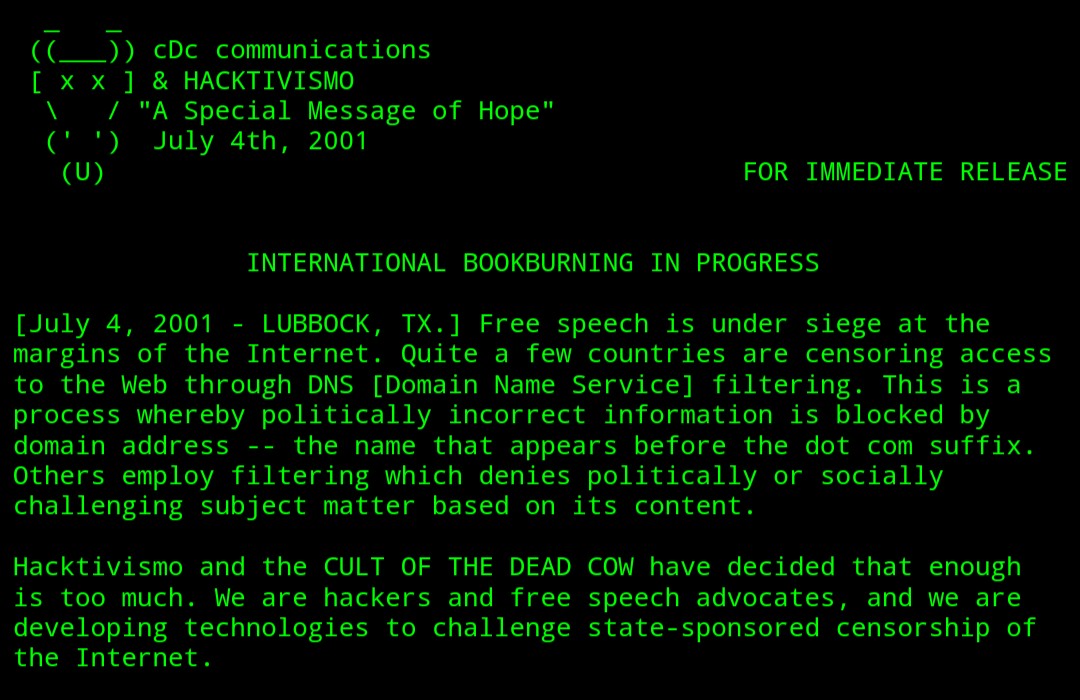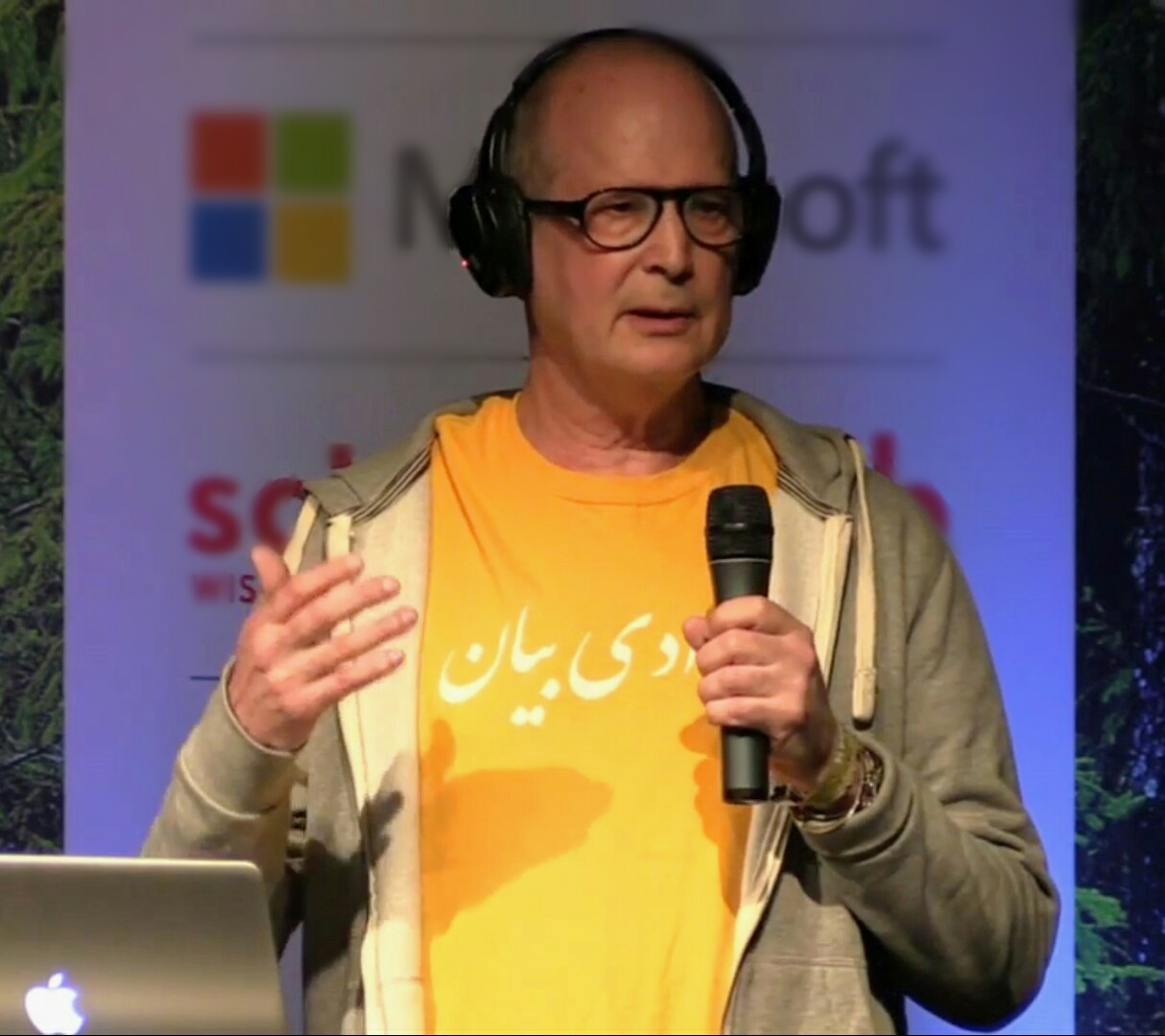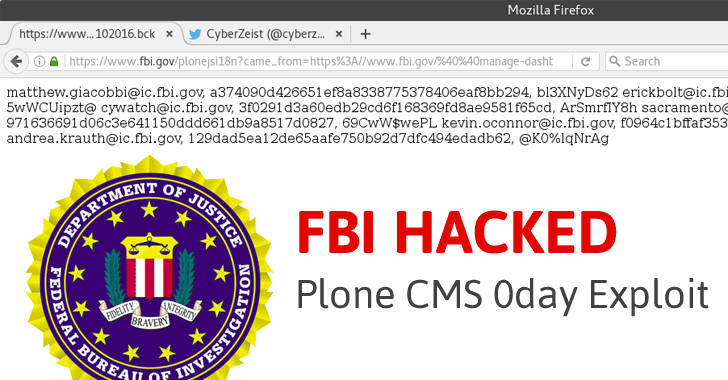
“Hacktivism, un messaggio speciale di speranza.” Così inizia la “Dichiarazione di Hacktivismo”, pubblicata il 4 luglio del 2001 dal celebre gruppo hacker Cult of the dead Cow (chiamati anche cDc o Omega).
“La libertà di parola è sotto assedio ai margini di internet. Parecchi paesi stanno censurando l’accesso al web…”
Si trattava di quell’attività che tenta di promuovere, impedire, dirigere o intervenire nelle riforme sociali, in quelle politiche ed economiche, con il desiderio principale di avviare dei forti cambiamenti all’interno di una società attraverso manifestazioni, sit-in, scioperi della fame e tanto altro ancora.
A seguito dell’avvento dei microcomputer e l’incremento della “cultura hacker”, si pensò che l’utilizzo dei computer per fini di attivismo, fosse un potente mezzo di protesta, che permettesse una maggiore efficacia. Pertanto dall’unione dei due termini appunto Hacking e Actvivism nacque Hacktivism.
L’idea generale dell’hacktivismo è stata articolata per la prima volta da John Perry Barlow, co-fondatore della Electronic Frontier Foundation, nella sua “Dichiarazione di indipendenza nel cyberspazio” del 1996, della quale abbiamo parlato su RHC.
Ma nessuno utilizzò questa parola prima del 1998, quando Omega (pseudonimo di Misha Kubecka), un membro di lunga data dei cDc, la cominciò ad utilizzare come fosse una sorta di battuta. Oxblood Ruffin, un membro dei cDc riporta in un documento: “in origine questa parola era più una battuta o uno scherzo. Ma dal primo momento in cui l’ho sentita dire da Omega, sapevo che avrebbe avuto un significato profondo, non solo per il cDc, ma per milioni di persone su Internet”.

Oxblood Ruffin
Quasi immediatamente “hacktivism” si diffuse a macchia d’olio. La parola suonava così bella che tutti volevano usarla come un parola di tendenza, anche se i giornalisti e gli attivisti avevano da poco scoperto la posta elettronica. All’improvviso, tutti sono diventati “hacktivist“. Nessuno aveva la più pallida idea di cosa significasse, ma suonava bene dirlo.
Le persone dei cDc principalmente interessate all’hacktivism erano Omega, Reid Fleming, Count Zero, Nightstalker, Tweety Fish e Oxblood Ruffin e ne discutevano sul loro listserv, attraverso e-mail private e alle convention di hacker, uno dei pochi posti in cui si sono incontrati fisicamente.
Fu Reid Fleming che portò sul tavolo la parola hacktivism, qualcosa di unico e nuovo, con quel tocco tecnologico che in quel periodo non guastava affatto. Reid creò hacktivism.org che conteneva una citazione dalla Dichiarazione universale dei diritti umani delle Nazioni Unite (UNDHR). Era l’articolo 19 e diceva: “Ogni individuo ha diritto alla libertà di opinione e di espressione; questo diritto include la libertà di avere opinioni senza interferenze e di cercare, ricevere e diffondere informazioni e idee attraverso qualsiasi media indipendentemente dalle frontiere”.
E l‘”indipendentemente senza frontiere” era l’elemento focale, il cyberspace è immateriale, come la radio e la televisione. Subito dopo i membri di cDc hanno iniziato a registrare i domini di primo livello. Count Zero ha preso hacktivism.net mentre Fleming prenotò, senza mai finire hacktivism.com.
L’Hacktivista non è motivato da un guadagno economico, ma da tutto ciò che viene considerato come “sbagliato” o “ingiusto”. Le motivazioni includono anche la vendetta, incentivi politici o sociali, ideologia, protesta, il desiderio di mettere in imbarazzo governi e le organizzazioni. Più precisamente, L’hacktivismo è un atto di attivismo sociale o politico che viene realizzato irrompendo e scatenando il caos all’interno di un sistema informatico ritenuto sicuro.
L’hacktivismo di solito è diretto verso obiettivi aziendali o governativi e le persone o i gruppi che svolgono attività di hacktivismo vengono definiti hacktivisti. Si tratta dell’utilizzo della tecnologia come mezzo dell’attivismo. Gli atti di hacktivismo generalmente ostacolano in qualche modo la normale attività dei sistemi causano quelli che chiamiamo “deface” (defacciamento in italiano), o significative perdite di dati.

Deface all’FBI del 22 dicembre 2016
cDc ha da sempre descritto come siamo finiti nel caos in cui ci troviamo oggi, dove i governi e società detengono un potere immenso sugli individui e come stiamo finalmente combattendo. Siamo disgustati da queste gravi violazioni delle informazioni e dei diritti umani. Ma gli hacker non sono disposti a guardare.
Gli attivisti sono criminali informatici? Molte persone la pensano in modo diverso.
Se sei l’unico a beneficiarne, non stai facendo hacking e tanto meno hacktivism.
Tu come la pensi a riguardo?
Di seguito la traduzione in italiano di “A Special Message of Hope” dei Cult Of The Dead Cow (cDc) realizzata da Olivia Terragni.
Hacktivismo: uno speciale messaggio di speranza
“Rogo internazionale di libri in corso”
4 luglio, 2001, Lubbock, Texas. La libertà di parola è sotto assedio, ai margini di Internet. Un bel po' di paesi stanno censurando l'accesso al Web tramite il filtraggio DNS [Domain Name Service]. Questo è un processo in cui le informazioni politicamente scorrette sono bloccate dall’indirizzo di dominio – il nome che appare prima del suffisso dot com.
Altri impiegano il filtraggio che nega politicamente o socialmente temi difficili da affrontare
In base al loro contenuto.
Hacktivismo e CULT OF THE DEAD COW hanno deciso che questo è troppo. Siamo hacker e sostenitori della libertà di parola, e stiamo sviluppando tecnologie per sfidare la censura di Internet sponsorizzata dallo stato.
La maggior parte dei paesi utilizza intimidazioni e filtri di un tipo o dell’altro che includono la Repubblica popolare cinese, Cuba e molti paesi islamici. La maggior parte afferma di bloccare i contenuti pornografici. Ma il vero motivo è impedire la diffusione di contenuti impegnativi attraverso regimi repressivi. Ciò include informazioni che vanno dalle opinioni politiche alle notizie "straniere", dalle questioni femminili ai lavori accademici, dalle informazioni religiose a quelle che riguardano i gruppi etnici sfavoriti e le notizie sugli abusi dei diritti umani, documenti che presentano le droghe in una luce positiva, nonché contenuti sui gay e lesbiche, tra gli altri.
La capricciosità della censura statale è di ampia portata. [1]
*Nello Zambia il governo ha tentato di censurare le informazioni rivelando i loro piani per referendum costituzionali.
* In Mauritania – come nella maggior parte dei paesi – i proprietari dei cybercafè sono tenuti a fornire agli agenti dell'intelligence governativa copie della posta elettronica inviati o ricevuti presso i loro stabilimenti.
*Anche governi meno draconiani, come quello della Malesia, hanno minacciato gli editori del web per aver violato le loro licenze di pubblicazione pubblicando aggiornamenti frequenti: le informazioni – tempestive e pertinenti – sono viste come una minaccia.
* La legge sulla sicurezza nazionale della Corea del Sud vieta ai sudcoreani di avere contatti, incluso il contatto su Internet, con i loro vicini nordcoreani.
* Lo Sri Lanka ha minacciato i siti di informazione di possibile revoca delle loro licenze in caso che la copertura di un'elezione presidenziale non sia a favore del partito del presidente uscente.
I rischi connessi all’accesso o alla diffusione delle informazioni sono spesso elevati.
* In Ucraina si ritiene che un corpo decapitato rinventuo vicino al villaggio di Tarachtcha sia quello di Georgiy Gongadze, fondatore ed editore di un quotidiano on-line critico nei confronti delle autorità.
* Nell'agosto del 1998 il diciottenne turco Emre Ersoz fu ritenuto colpevole di "insulto alla polizia nazionale" in un forum Internet dopo aver partecipato ad una manifestazione repressa violentemente dalla polizia. Il suo ISP ha fornito alle autorità il suo indirizzo.
* Il giornalista Miroslav Filipovic ha il triste primato di essere stato il primo giornalista accusato di spionaggio a causa di articoli pubblicati su Internet – in questo caso descrivendo dettagliatamente gli abusi di alcune unità dell'esercito jugoslavo in Kosovo.
Siamo disgustati da queste vergognose violazioni dell'informazione e dei diritti umani. Le democrazie liberali sono di gran lunga migliori a parole che nei fatti sull'accesso alle informazioni. Ma gli hacker non sono disposti a guardare i custodi della
Convenzione Internazionale sui diritti civili e politici e della Dichiarazione Universale dei Diritti Umani trasformarsi in una farsa. Noi vogliamo far seguire le parole ai fatti.
Hacktivismo e CULT OF THE DEAD COW pubblicano la HACKTIVISMO DECLARATION come dichiarazione di sdegno e dichiarazione di intenti. È la nostra Magna Carta per il diritto all’informazione. Le persone hanno un diritto ad un accesso ragionevole alle informazioni altrimenti pubblicate legittimamente. Se i nostri leader non sono preparati a difendere Internet, lo siamo noi.
-----------------------------------------------------------------------------------------------------------------------
[1] alcune informazioni citate nel presente comunicato stampa erano entrambe parafrasate, o citate direttamente, dal rapporto "Nemici di Internet" pubblicato da Reporters Without Frontiers e può essere trovato su http://www.rsf.fr
/>/>/>/>/>/>/>/>/>/>/>/>/>/>/>/>/>/>/>/>/>/>/>/>/>/>/>/>/>/>/>/>/>/>/>/>/>/>/>/>/>/>/>/>/>/>
HACKTIVISMO DECLARATION
affermazioni di libertà a sostegno di un internet senza censura
PROFONDAMENTE ALLARMATI che la censura di Internet sponsorizzata dallo stato si stia rapidamente diffondendo tramite l'assistenza delle società transnazionali,
PRENDENDO COME BASE i principi e gli scopi sanciti nell'Articolo 19 della Dichiarazione universale dei diritti umani (UDHR) che afferma,
_Ogni individuo ha diritto alla libertà di opinione e di espressione; questo diritto include la libertà di avere opinioni senza interferenze e di cercare, ricevere e impartire informazioni e idee attraverso ogni mezzo e senza riguardo alle frontiere_, e l'Articolo 19 del Patto internazionale sui diritti civili e politici (ICCPR) che afferma,
1. Ogni individuo ha il diritto di avere opinioni senza interferenze.
2. Ogni individuo ha diritto alla libertà di espressione; questo diritto include la libertà di cercare, ricevere e impartire informazioni e idee di ogni genere, senza riguardo alle frontiere, sia oralmente, per iscritto o a mezzo stampa, in forma artistica, o attraverso ogni altro mezzo di sua scelta.
3. L'esercizio dei diritti previsti nel paragrafo 2 di questo articolo comporta doveri e responsabilità speciali. Può quindi essere soggetto a determinate restrizioni, ma queste saranno solo quelle previste dalla legge e necessarie:
(a) Per il rispetto dei diritti o della reputazione altrui;
(b) Per la protezione della sicurezza nazionale o dell'ordine pubblico, o della salute o della morale pubblica.
RICORDANDO che alcuni stati membri delle Nazioni Unite hanno firmato l'ICCPR o l'hanno ratificato in modo tale da impedire ai loro cittadini di utilizzarlo nei tribunali,
CONSIDERANDO che tali stati membri continuano a sopprimere volontariamente l'accesso su vasta scala alle informazioni pubblicate legalmente su Internet, nonostante il chiaro linguaggio dell'ICCPR secondo cui la libertà di espressione esiste in tutti i media,
PRENDENDO NOTA che le multinazionali continuano a vendere tecnologie dell'informazione ai regimi più repressivi del mondo sapendo benissimo che saranno utilizzate per tracciare e controllare una cittadinanza già tormentata,
TENENDO CONTO che Internet sta rapidamente diventando un metodo di
repressione piuttosto che uno strumento di liberazione,
TENENDO PRESENTE che in alcuni paesi è un crimine richiedere il
diritto di accesso alle informazioni pubblicate legalmente e di altri diritti umani fondamentali,
RICORDANDO che gli stati membri delle Nazioni Unite hanno fallito nel fare pressione sui più eclatanti violatori dei diritti di informazione del mondo a standard più elevati,
CONSAPEVOLI che negare l'accesso alle informazioni potrebbe portare a un declino spirituale, intellettuale ed economico, promozione della xenofobia e alla
destabilizzazione dell’ordine internazionale,
PREOCCUPATI che governi e multinazionali siano complici nel mantenere lo status quo,
PROFONDAMENTE ALLARMATI dal fatto che i leader mondiali non siano riusciti a gestire l’informazione su questioni relative ai diritti direttamente e senza equivoci,
RICONOSCENDO l'importanza di lottare contro le violazioni dei diritti umani con
rispetto all’accesso ragionevole alle informazioni su Internet,
SIAMO QUINDI CONVINTI che la comunità internazionale degli hacker abbia un imperativo morale ad agire, e noi
DICHIARIAMO:
*QUEL PIENO RISPETTO DEI DIRITTI UMANI E DELLE LIBERTÀ FONDAMENTALI
CHE INCLUDE LA LIBERTÀ DI UN ACCESSO EQUO E RAGIONEVOLE ALLE INFORMAZIONI, SIA TRAMITE LA RADIO A ONDE CORTE, LA POSTA AEREA, LA TELEFONIA SEMPLICE, L’INTERNET GLOBALE O ALTRI SUPPORTI.
* CHE RICONOSCIAMO IL DIRITTO DEI GOVERNI DI VIETARE LA PUBBLICAZIONE DI SEGRETI DI STATO ADEGUATAMENTE CATEGORIZZATI, PORNOGRAFIA INFANTILE,
E QUESTIONI LEGATE ALLA PRIVACY E AI PRIVILEGI PERSONALI, TRA LE ALTRE
RESTRIZIONI ACCETTATE. MA NOI CI OPPONIAMO ALL'USO DEL POTERE STATO PER IL CONTROLLO DELL’ACCESSO ALLE OPERE DI CRITICI, INTELLETTUALI, ARTISTI O RELIGIOSI.
*CHE LA CENSURA DI INTERNET SPONSORIZZATA DALLO STATO ERODE LA PACIFICO E CIVILIZZATA CONVIVENZA, INFLUISCE SULL’ESERCIZIO DELLA DEMOCRAZIA E METTE IN PERICOLO LO SVILUPPO SOCIOECONOMICO DELLE NAZIONI.
*CHE LA CENSURA DI INTERNET SPONSORIZZATA DALLO STATO È UNA FORMA SERIA DELLA VIOLENZA ORGANIZZATA E SISTEMATICA CONTRO I CITTADINI, MIRA A GENERARE CONFUSIONE E XENOFOBIA, ED È UNA VIOLAZIONE RIPROVEVOLE DELLA FIDUCIA.
* CHE STUDIEREMO MODI E MEZZI PER AGGIRARE LA CENSURA DI INTERNET SPONSORIZZATA DALLO STATO E IMPLEMENTERA' TECNOLOGIE PER SFIDARE LE
VIOLAZIONI DEI DIRITTI D'INFORMAZIONE.
Pubblicato il 4 luglio 2001 da Hacktivismo e CULT OF THE DEAD COW.
Collegamenti Web rilevanti:
Dichiarazione Universale dei Diritti Umani
http://www.un.org/Overview/rights.html
Patto internazionale sui diritti civili e politici
http://www.unhchr.ch/html/menu3/b/a_ccpr.htm
Reporter Without Frontiers
http://www.rsf.fr
CULT OF THE DEAD COW
http://www.cultdeadcow.com
Fonti
https://cs.stanford.edu/people/eroberts/cs181/projects/2010-11/Hacktivism/what.html
https://web.archive.org/web/20090502054355/http://www.cultdeadcow.com/cDc_files/declaration.html
Ti è piaciuto questo articolo? Ne stiamo discutendo nella nostra Community su LinkedIn, Facebook e Instagram. Seguici anche su Google News, per ricevere aggiornamenti quotidiani sulla sicurezza informatica o Scrivici se desideri segnalarci notizie, approfondimenti o contributi da pubblicare.

 Cybercrime
CybercrimeLe autorità tedesche hanno recentemente lanciato un avviso riguardante una sofisticata campagna di phishing che prende di mira gli utenti di Signal in Germania e nel resto d’Europa. L’attacco si concentra su profili specifici, tra…
 Innovazione
InnovazioneL’evoluzione dell’Intelligenza Artificiale ha superato una nuova, inquietante frontiera. Se fino a ieri parlavamo di algoritmi confinati dietro uno schermo, oggi ci troviamo di fronte al concetto di “Meatspace Layer”: un’infrastruttura dove le macchine non…
 Cybercrime
CybercrimeNegli ultimi anni, la sicurezza delle reti ha affrontato minacce sempre più sofisticate, capaci di aggirare le difese tradizionali e di penetrare negli strati più profondi delle infrastrutture. Un’analisi recente ha portato alla luce uno…
 Vulnerabilità
VulnerabilitàNegli ultimi tempi, la piattaforma di automazione n8n sta affrontando una serie crescente di bug di sicurezza. n8n è una piattaforma di automazione che trasforma task complessi in operazioni semplici e veloci. Con pochi click…
 Innovazione
InnovazioneArticolo scritto con la collaborazione di Giovanni Pollola. Per anni, “IA a bordo dei satelliti” serviva soprattutto a “ripulire” i dati: meno rumore nelle immagini e nei dati acquisiti attraverso i vari payload multisensoriali, meno…